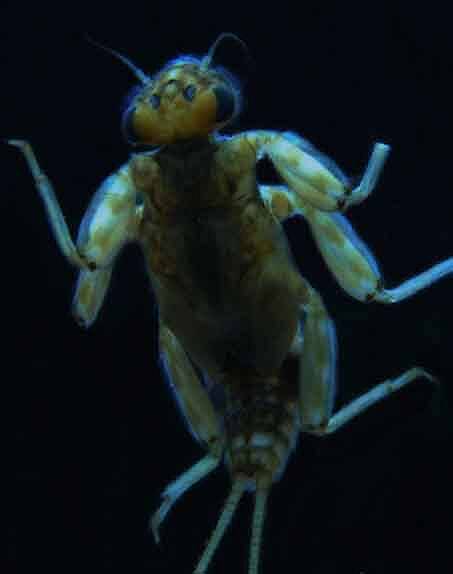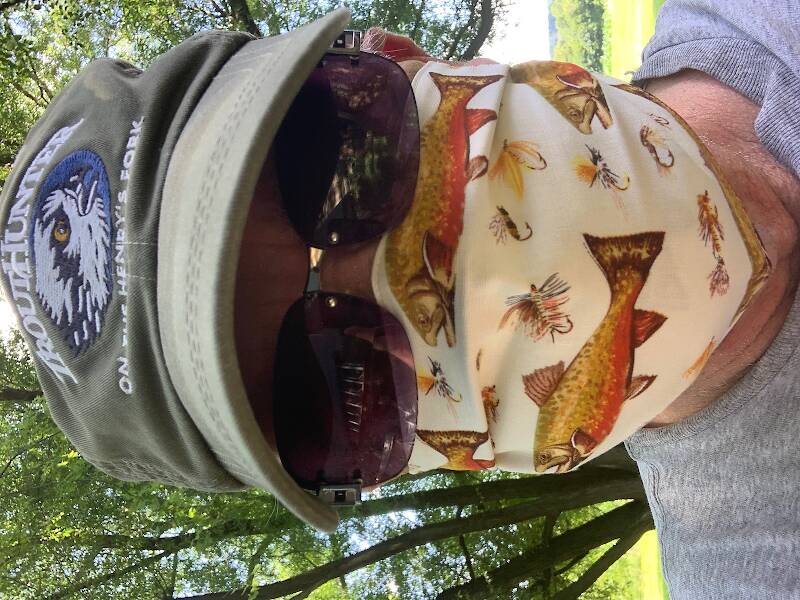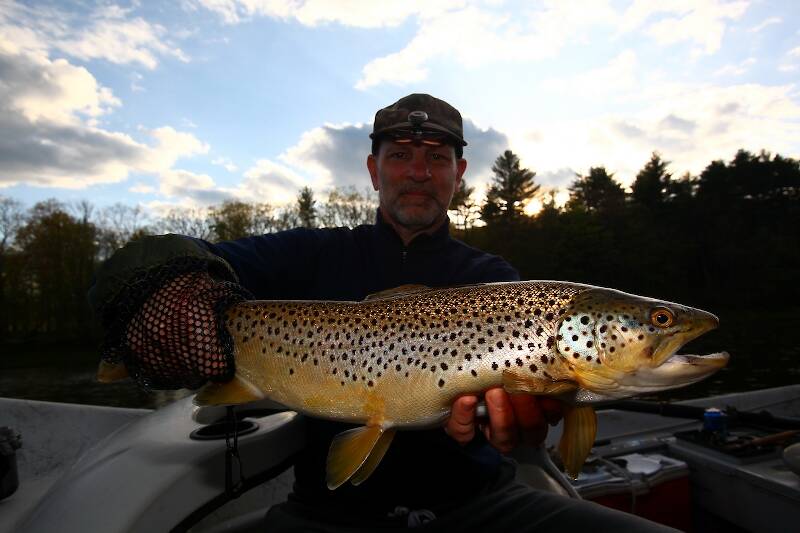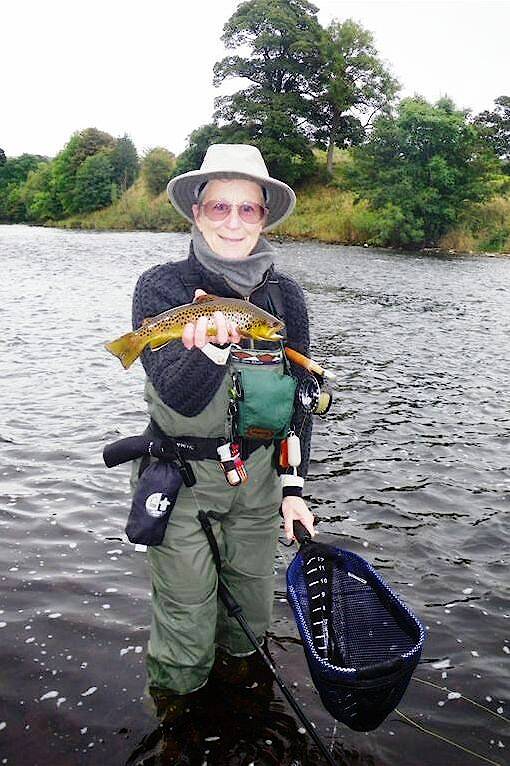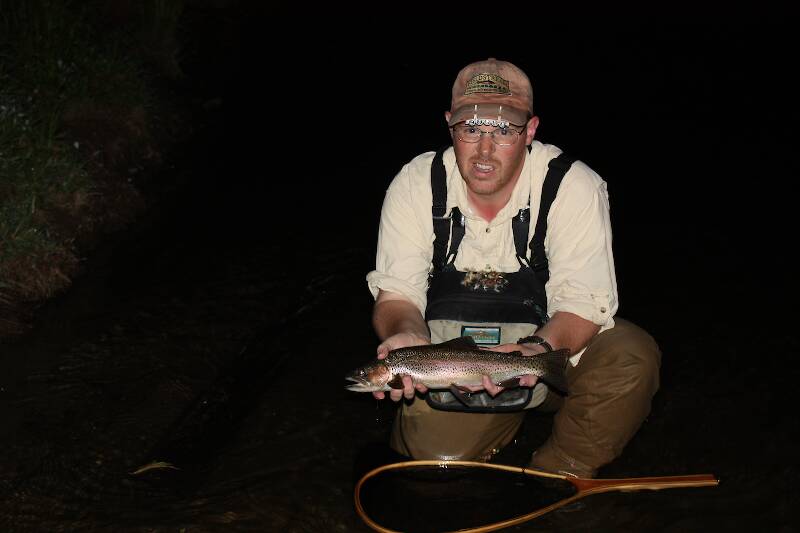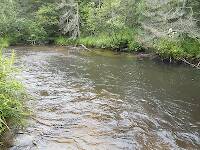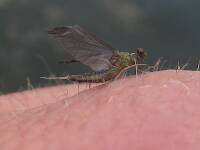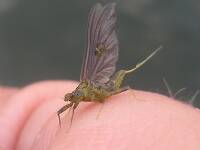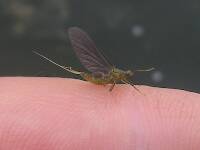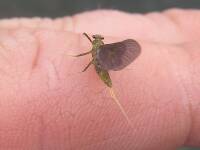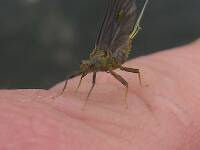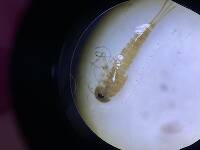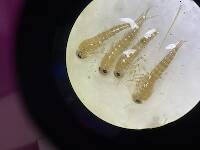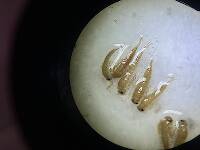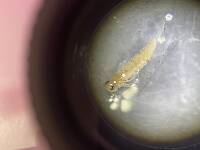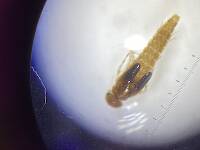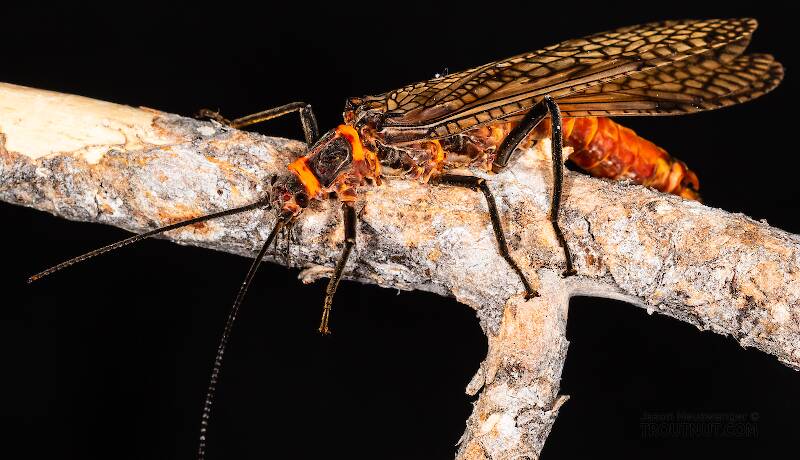
Salmonflies
Pteronarcys californica
The giant Salmonflies of the Western mountains are legendary for their proclivity to elicit consistent dry-fly action and ferocious strikes.
Featured on the forum
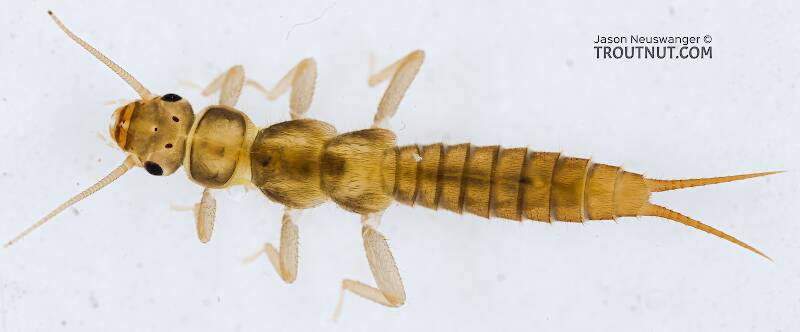
This species was fairly abundant in a February sample of the upper Yakima.

Troutnut is a project started in 2003 by salmonid ecologist Jason "Troutnut" Neuswanger to help anglers and
fly tyers unabashedly embrace the entomological side of the sport. Learn more about Troutnut or
support the project for an enhanced experience here.
GONZO on Jul 3, 2007July 3rd, 2007, 3:58 pm EDT
I hadn't heard that name until Jason mentioned it here. Funny and coincidental about the new species in Borneo, but unless that becomes a hot new fly-fishing destination, I suppose the confusion should be minimal. I'm assuming that the Borneo mayfly is also black, or does it have some other connection to the Darkside of the Force? (There's probably a "Luke, I am your father" joke in there somewhere, but I suppose that would be just between us.) ;)
IEatimago on Jul 4, 2007July 4th, 2007, 5:04 am EDT
Were the three-tailed "BWOs" emerging in the morning? If so, they are probably Drunella. The nymphs are pretty distinctive; they have the typical crawler shape with noticeably fat and flattened front-leg femurs.
i belive it was around 10 or 11 am.
i belive it was around 10 or 11 am.
GONZO on Jul 4, 2007July 4th, 2007, 5:55 am EDT
Jasen, that timing would be right for the second, smaller hatch of Drunella lata (the version formerly known as D. cornutella), especially after a cool night, on a cool overcast day, or on streams with consistently cold water. (They usually hatch earlier in the morning during hot weather on larger freestone streams.) Of course, it can also be the right timing for paraleps at this time of year, but I'm pretty sure you'd know the difference. Attenella attenuata could also be a possibility, but I find that Drunella are much more important on most PA streams.
D. lata have very light green bodies when they first emerge, but they darken rather quickly to a dull dark olive. This second cohort of lata is usually about #16-18. (Compared to #14 or even #12 for the earlier group that used to be called cornuta.) The little Serratella I mentioned often share the water with the Drunella. Like Drunella and Attenella, they are also 3-tailed members of the Ephemerellidae, but are smaller and blackish.
D. lata have very light green bodies when they first emerge, but they darken rather quickly to a dull dark olive. This second cohort of lata is usually about #16-18. (Compared to #14 or even #12 for the earlier group that used to be called cornuta.) The little Serratella I mentioned often share the water with the Drunella. Like Drunella and Attenella, they are also 3-tailed members of the Ephemerellidae, but are smaller and blackish.
JAD on Jul 4, 2007July 4th, 2007, 7:21 am EDT
LLoyd
Quote---Compared to #14 or even #12 for the earlier group that used to be called cornuta.)
What did they change Cornuta to??
JaD
They fasten red (crimson red) wool around a hook, and fix onto the wool two feathers which grow under a cock’s wattles, and which in colour are like wax.
Radcliffe's Fishing from the Earliest Times,
GONZO on Jul 4, 2007July 4th, 2007, 11:01 am EDT
John,
The former Drunella species cornuta, cornutella, and longicornus are all now synonyms of lata. I know these revisions can be confusing, but the characters that were used to distinguish the former species were found to be variable and are no longer considered valid.
PS--The "they" you refer to is (in part) our good friend, Konchu!
The former Drunella species cornuta, cornutella, and longicornus are all now synonyms of lata. I know these revisions can be confusing, but the characters that were used to distinguish the former species were found to be variable and are no longer considered valid.
PS--The "they" you refer to is (in part) our good friend, Konchu!
GONZO on Jul 7, 2007July 7th, 2007, 9:17 am EDT
Sorry if I blew your cover, Luke. I just thought that if anyone wanted to talk/complain about the revisions, they may as well hear it from the horse's mouth! (I, on the other hand, tend to be a bit closer to the other end of the equine when it comes to things entomological.) :)
Konchu on Jul 7, 2007July 7th, 2007, 10:55 am EDT
As I've said to several people in PMs, I am open to discussion and debate. Almost all of what I see is dead. I can cover more territory that way, but I only get part of the story. Dead mayflies don't talk...but flyfishers do.
Wiflyfisher on Jul 7, 2007July 7th, 2007, 11:56 am EDT
Dead mayflies don't talk...but flyfishers do.
Some FF'ers I have seen on various rivers don't talk much either, except to say "Ya, I caught thum on a lil gray bastard about so big!" Very scientific approach!
John S.
https://WiFlyFisher.com
https://WiFlyFisher.com
Martinlf on Jul 10, 2007July 10th, 2007, 10:40 am EDT
Central PA, we have Tricos.
"He spread them a yard and a half. 'And every one that got away is this big.'"
--Fred Chappell
--Fred Chappell
CaseyP on Jul 10, 2007July 10th, 2007, 4:50 pm EDT
oh, yes, we do. Falling Springs had a lovely hatch Monday. hooray for spinners with bright antron wings!
"You can observe a lot by watching." Yogi Berra
Martinlf on Jul 11, 2007July 11th, 2007, 1:10 am EDT
Casey, John W, I may head down to Falling Spring Friday. Might either of you be around?
"He spread them a yard and a half. 'And every one that got away is this big.'"
--Fred Chappell
--Fred Chappell
JOHNW on Jul 11, 2007July 11th, 2007, 10:09 am EDT
Sorry some of us actually have to work on weekdays ;)
Then to top that off I have to work this weekend as well. The only consolation is I'm off on the 20th.
JW
Then to top that off I have to work this weekend as well. The only consolation is I'm off on the 20th.
JW
"old habits are hard to kill once you have gray in your beard" -Old Red Barn
Martinlf on Jul 11, 2007July 11th, 2007, 4:48 pm EDT
JW, I was hoping you were taking paternity leave. :) Oh well. Hope the mom and the little one are enjoying themselves.
"He spread them a yard and a half. 'And every one that got away is this big.'"
--Fred Chappell
--Fred Chappell
JOHNW on Jul 14, 2007July 14th, 2007, 6:14 am EDT
Paternity leave that is funny!!!!!!
I have three words for you:
"For Proffit Hospital"
Top that off I now have to work Fri the 20th.
JW
I have three words for you:
"For Proffit Hospital"
Top that off I now have to work Fri the 20th.
JW
"old habits are hard to kill once you have gray in your beard" -Old Red Barn
Martinlf on Jul 14, 2007July 14th, 2007, 6:20 am EDT
Darn, JW. That sucks. Sorry to hear it. Hope you can shake free for some stream time soon. I did leave you a message on this site--see the little orange envelope at the log in spot. What the heck, I'll put it in an email, which I know you check more frequently.
"He spread them a yard and a half. 'And every one that got away is this big.'"
--Fred Chappell
--Fred Chappell
Quick Reply
Related Discussions
Topic
Replies
Last Reply
10
Dec 18, 2013
by Brookyman
by Brookyman
7
May 12, 2008
by GONZO
by GONZO
4
May 24, 2008
by Softhackle
by Softhackle



